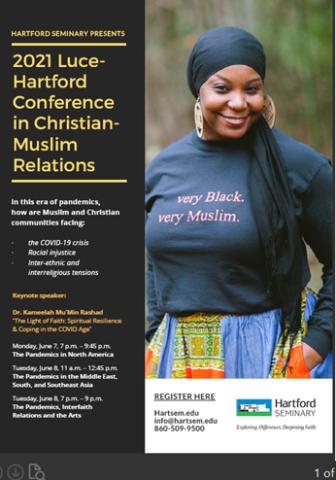2021 Luce-Hartford Conference in Christian-Muslim Relations

Christian-Muslim relations in the Midst of the Pandemics: Activities, Opportunities, and Challenges
In 2020, we witnessed the rise of a global pandemic that brought the world to a standstill, as nations and communities struggled to contain the novel coronavirus. In the United States COVID-19 not only exacerbated a deeply divided electorate that politicized the health crisis, but it also revealed pandemics of racism and white nationalism. Throughout the world, the virus did not discriminate between nations, between citizens or immigrants, or between religious communities. Muslims and Christians found themselves victims to the same virus. Yet, the impact has been felt unevenly, perhaps even unjustly. For Christians and Muslims, COVID-19 has disrupted traditional patterns of worship and community life. It has also affected and perhaps spurred, opportunities for interfaith engagement that address the longstanding pandemics of racial injustice, inter-ethnic and interreligious tensions.
The 2021 Luce-Hartford Conference on Christian-Muslim relations will focus on the current state of Muslim and Christian relationships within congregations, masjids, Islamic centers, and social services in the midst of the COVID-19 health care crisis and the longstanding pandemics of racial injustice, inter-ethnic and interreligious tensions.
We are interested in descriptions and analyses of Muslim and Christian intercommunal relationships in specific urban, suburban, or rural contexts, and how they have responded to these pandemics in the United States and in Asia. Have the more recent public events and vitriolic debates surrounding these pandemics contrived to curtail and put pressure on established interreligious or inter-ethnic relationships? Or, have the pandemics led to unique interfaith encounters and positive outcomes?
The presentations in this virtual conference will examine the specific social-cultural-political contexts out of which Christian-Muslim intercommunal projects arose and developed, the impetus for relationships, and the challenges to economic, political, ethnic, racial, social, and religious realities. We will explore how Muslim and Christian relationships have been affected by these intertwined global pandemics and how Muslim and Christian communities have sought to address the public challenges of the public health concerns caused by COVID-19 in the midst of public racism, bigotry, intercommunal violence, Islamophobia, sectarian nationalisms, and, and how Muslim and Christian communities have worked across boundaries and through the virtual world to overcome these public challenges.
The conference will address:
How COVID-19 has disrupted and impacted previous Muslim-Christian relationships, or how it has galvanized communities to new activities, Methods that Christian and Muslim communities have developed to continue providing interreligious opportunities, The role of racism and Islamophobia on African-American Muslim and Christian communities, Interfaith engagement and opportunities that have responded to religious nationalisms, and Opportunities for interfaith networking
Join our mailing list
Keep up with all the latest happenings at Hartford International.

